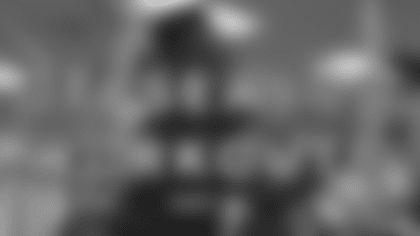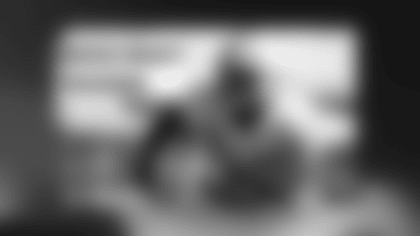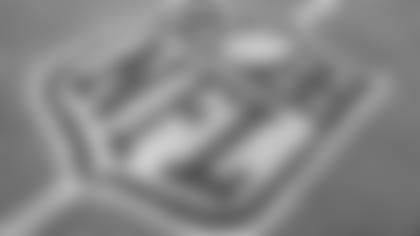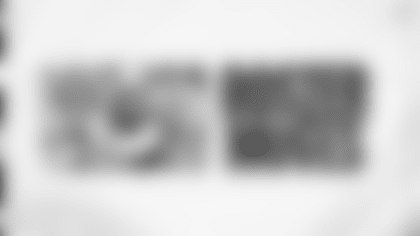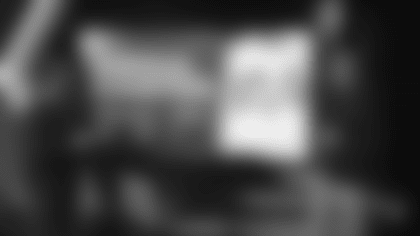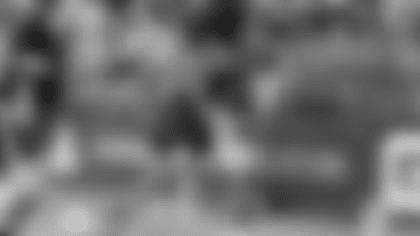Patriots head coach Bill Belichick addresses the media during his press conference at Gillette Stadium on Wednesday, November 18, 2009.
BB: Alright we're, of course, back in the division here, big game with the Jets. They obviously beat us the last couple of times. We've been in a couple real competitive games with them, but we've just got to see if we can do a little bit better job this week and be more competitive with them than we've been the last couple times. They've done a great job running the ball. Of course - [Thomas] Jones, [Shonn] Greene - they have a good running attack all the way across the board. They do a lot of different things; [they] change up their scheme a lot. It's not just one or two plays; they have quite a variety in their running game. Of course, that feeds into everything else - the play action, their gadget plays and things like that. Defensively, they've done a real good job there, been consistent all year, played very well, haven't given up many points. They've given up a few in their return game, but defensively they're right at the top of the league - very good on third down. [They're] a physical group. [They're] very good in the kicking game, like they always are; Justin Miller, we've had our problems with him before. [They have] good specialists. They've been explosive on that side of the ball too with some fake punts. It came real close to getting that field goal against Jacksonville at the end of the game, so they're competitive in all phases of the game. They lost a couple games here, but they've all come down to the last play. They've been right there with everybody and had their chances, so I'm sure they're frustrated with that. One or two plays here and there and you're talking about a team that could have easily seven wins, maybe more than that, maybe eight. So that's what we're looking at this week.
Q: How different is their defense without Kris Jenkins?
BB: I don't think you can replace a player like that, but I think [Sione] Pouha's done a good job for them in there. He's a big physical guy. They rolled him in there anyway - their defensive line, they kind of had a little bit of a rotation system. All those guys play, so you have to be ready for all of them. [Kris] Jenkins is a good player, don't get me wrong, but all those guys have played and they're still pretty stout.
Q: What's the toughest thing Darrelle Revis did last time on Randy Moss?
BB: Really, they played a lot of over the top coverage with Revis and [Kerry] Rhodes. They played over the top of him quite a bit, not always, but quite a bit. Revis is a good player. He matches up against basically every team's best receiver. He's tall for a corner. He has good length, good size, very good ball skills, runs well, good quickness, good on the jam, good tackler, good run-force player. He's a good, solid all-around player. He doesn't have any weaknesses. He does everything at least good, if not real good, compared to the other players in his position throughout the league. He's a smart guy, [he's] instinctive. He has a good feel for zone coverage. He does a good job of freeing up and helping sometimes when he isn't threatened by the route, the receiver or a formation. He's a pretty instinctive player. You've got to watch out for him. He sometimes roams around back there, a little bit like Kerry Rhodes does, and [Lito] Sheppard for that matter. They do a good job. They are well-coached and they're pretty instinctive back there in the secondary. They know what's going on in the passing game, who needs help, where the quarterback is trying to throw and they go over there and dig them out.
Q: Does Isaiah Stanback still have a lot of room to improve because his background is at quarterback?
BB: He's been playing receiver for a couple years now in Dallas. He didn't play quarterback down there. He played quarterback for us when we signed him to the practice squad at the beginning of the season and he's worked at quarterback and worked at receiver. And he continues to work at both spots. I think his biggest adjustment is coming into our offense. I think a lot of the fundamental things - as a receiver - he's progressed pretty well on from his two years in Dallas and then doing some of it here. But I think the big thing for him is just learning our offense, our adjustments and the differences in the routes and the timing compared to what he did in Dallas.
Q: Would you generally assume it is a hurdle to change positions and are there any advantages?
BB: I think for a player to go from quarterback to receiver as Isaiah's done, I think one of the advantages he has is that he understands what the quarterback's looking at. For a younger player that hasn't had a lot of game experience, he's had a lot of practice and preseason experience. But in terms of playing the game in competitive regular season games, I think he has a better than average feel for how to come open, when to come open on certain routes and what the quarterback's looking at. For anybody that's played quarterback, you know it doesn't really help you for a receiver to come open when either you can't or you're not ready to throw them him the ball, so it doesn't really do you any good. On the other hand, it's better if a receiver is open when you are ready to throw, regardless if it's the exact route that you're trying to run. Maybe it's a little bit shorter, maybe it's a little bit wider, maybe it's not perfect - but if he's open at the right time, that's a lot better than being open at the wrong time. So there's a sense of timing and spacing that an instinctive player at both of those positions understands and does. I think, like I said, Isaiah has a better than average feel for that.
Q: How much did you miss Wes Welker in the first game?
BB: It's kind of like we said about [Kris] Jenkins. Wes is a good player, but I thought Julian [Edelman] did a good job. Julian played in the slot that game, made some plays. I thought he did a pretty good job playing in there. Wes Welker is Wes Welker. Kris Jenkins is Kris Jenkins. I'm not saying anybody can replace them, but I thought Julian did a good job. I'm glad we have Julian. I'm glad we have Wes.
Q: Is your receiving core deeper now that you have all the guys?
BB: Well, we don't have the exact same players. I'm glad we have who we have going in there. Hopefully, we'll be able to be a little more productive than we were the last time.
Q: How much do statistics play a factor into making critical decisions?
BB: I think in a decision-making process there are a lot of factors. You put them all together, you combine them all. Sometimes, some things outweigh others. I think every situation is different and that's the way I treat it.
Q: Do you have any reaction to Rex Ryan breaking down and crying in front of the team?
BB: I'm just really worried about coaching our team. My biggest concern is the New England Patriots and getting ready for the Jets. I'm sure that Rex will have them ready, which he does. He certainly had them ready in our first game and they played well against us.
Q: Have you ever cried in front of the team?
BB: I've coached for 35 years, so I probably covered most all the bases. I think I swore once, too.
Q: When you get together with the team this morning, do you address the past game or is it just assumed that we're moving right on to the next game?
BB: When I talk to the team, I address whatever I feel is pertinent and important to that team, whatever those things are. It could be a collection of things. It's certainly about what's ahead, and what we're going to do today and what I feel like the goals for the team need to be on a short-term basis - in the next few hours and the next day - with whatever our next target is, in this case it being the Jets.
Q: I know you are always looking ahead at the next game, but last game took a toll on everyone and is that something as a coach you have to be aware of?
BB: I think you talk about what the current situation is. Today is Wednesday, we talk about Wednesday. We weren't in Monday and Tuesday, then we talk about Sunday and some of the things that lead up to that. But the most important thing we talk about is what is going to happen in the next few hours, between eight o'clock and when we get done later on in the afternoon, let's say 4:30. That eight-hour period, right now, that's the most important hours of our lives for our football team.
Q: You mentioned on Monday how good Reggie Wayne played. Do you reinforce that with Jonathan Wilhite to say even though you got beat a couple times don't get discouraged?
BB: Yeah, I think anytime you play a game, you look at the game and make the corrections. There're some things that happen in every game that pretty much a player did what he could do and there's not always the optimal result on that. And then there are other times when players didn't do what they were expected to do, or maybe their assignment was on that play, then that's something that you can correct. If you are playing inside, then you're a little bit light on the outside route. If you're playing outside, you're a little bit light on the inside route. If you're playing behind the receiver, you're a little bit light on a route in front of you. If you're playing in front of a receiver, you're a little bit light behind you. You can't be two places at once. Either somebody else has to be there or that's something that you're forcing the offense to go to an area that you've defended one part of it, but there's another part of it that's not defended with your technique. There're four quadrants. You can take two of them, but you can't take all four of them, it is impossible. I think that's inherent in any type of coverage, whether it's basketball, football or whatever it is where you're on a man.
Q: Related to that, it seemed like Reggie Wayne didn't catch any deep balls. Were you trying to take the deep ball away?
BB: Well, he caught a ball down the sideline. It was probably the best play I've seen all year. Are we saying he didn't catch any down there? What are we saying?
Q: Were you trying to take away more of the deep route as opposed to the crossing routes?
BB: Look, you're never trying to give up deep balls. There's no defense designed to say, 'OK, if they throw an 80-yard touchdown, we're good on that.' It always starts with taking away deep balls, either by technique or by the design of the defense. If the design of the defense is that there's nobody behind you, then you have to play behind the receiver to take away the deep balls. If you have somebody behind you, then you play in some kind of leverage position where between you and the guy that's behind you. Somebody is responsible for defending those. Absolutely, I mean, it's the same thing in the running game. You never have a defense where nobody's assigned to turn the ball back in. If they hand it off, and run outside and run down the sideline. You can't sit there and say, 'We're OK on that.' I mean, we're not OK, somebody's got to defend that. Somebody's got to defend deep balls.
Q: Have you see the decisions that Mark Sanchez has made being pretty standard fare for a young quarterback?
BB: I think Mark's done a good job for them. I think they've evolved into a team that is a good running team and with that comes play action and some of the third-down situations are residual or what they've done on early downs in the running game. I think their offense is pretty efficient overall, and it certainly was against us and that's really what it comes down to. I wouldn't get too caught up on the statistics and all that. I am more interested in what the team looks like when you watch them play and I see it on a pretty consistent level that the Jets are able to move the ball, and they're able to get in a scoring position and were able to score more points than we were. That's what I see. I think Mark's done a good job of playing his position, managing the game, throwing the ball where it's supposed to be thrown, handling all the things a quarterback has to handle. I mean, is it perfect? I mean, I can't say that about anybody, but I think he's done a good job.
Q: Are you satisfied with progression of your defense after nine weeks?
BB: I mean, everything we do could be better. I don't think we [are] where we can ultimately be. I think we're going to get better on a weekly basis in every phase of the game - offense, defense, special teams. I put every player, every unit and every coach in that category.
Q: How much better are you now than you were in Week Two?
BB: We're definitely better than we were in Week Two, but so is everybody else. Everybody else is better, too. I would hope after seven games and 20-something practices - however many it's been - that we've improved. I mean, we've definitely improved, but I look at every other team and they've definitely improved, too, so it's not about improvement it's about the rate of improvement.
Q: Is Isaiah Stanback just a receiver now?
BB: No, he does both.
Q: What do the guys have to do up front to handle the Jets blitzes?
BB: Well, I think the biggest thing you have to do when you play the Jets is you just have to have everybody offensively on the same page. It's not about one guy, it's about six or seven guys seeing a picture and seeing it the exact same way. If somebody sees it differently, then you're going have a breakdown and that's where they do a good job. They give you looks and then things happen. They do things before the snap and then things happen after the snap and then you have to, as a team, identify the quarterback, the receivers, the protection, the offensive line, the backs [and] the tight ends. They very rarely put you in a situation where your linemen just have to block their linemen. You have other guys involved, so your backs and your tight ends all have to be coordinated on that and your quarterback and receivers and running backs - whoever the hot guys are if there is one - then have to be coordinated on that, too, so that the guy you don't block, that you throw the ball to somebody before he can get there. That has to be part of the passing game. It just requires a lot of coordination on the offensive side of the ball as a total unit. It's not about one guy. It's individual matchups, too. Don't get me wrong, you still have to block them. Just because I know who to block doesn't mean that guy gets blocked. But that's a big part of the problem is just making sure you have all the players that we're responsible for that we actually get that done. And then the guys that we're not responsible for - the quarterback and the receivers - have to handle that as in part of the passing game, however that's designed. That's the challenge. And they do a good job of it. They put a lot of pressure on you to execute that as a total offensive unit. In addition, you still have to block. You have to block [Bryan] Thomas. You have to block [Calvin] Pace. You've got to block [Shaun] Ellis. You've got to block those guys - [David] Harris, all the rest of them, [Bart] Scott, so that's a problem, too.
Q: The last time you played them they didn't have Braylon Edwards. Are they doing anything differently with him in there?
BB: I think he's a big factor for them in the passing game. I think it's given them a lot of balance in the passing game with [Jerricho] Cotchery, and of course they still use [David] Clowney some. And [Dustin] Keller is a big factor for them. It just provides more options for them. Edwards is a guy that can do it all. I mean, he can make the tough catches. He's a big target. He's a guy that can go down the field and get the ball. He's a good red area receiver, so I think he's added a lot to the passing game. He's balanced it off at the receiver position with Keller inside. That gives them good spacing across the field from perimeter receivers to inside tight ends. There're good options for them in the passing game, so that definitely challenges the defense - especially, when you combine that with the top running attack in the league, you have a lot to defend.


